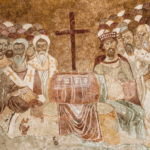Quick Questions About Christianity
Terrible things happen in this world and no one can pretend to really understand why. Even the Bible acknowledges that this question is beyond the wisest person (Ecclesiastes 8:14-17). Yet, while suffering makes faith in God difficult for many people it need not force us to the conclusion that there is no God or that God is not good. In fact we might even say that the fact that we recognise suffering as evil (especially other people’s), shows that we know the world isn’t supposed to be like that.[1]
Here (very briefly!) are some the ways the Bible encourages us to think about the problem of pain and suffering.
1. We suffer because of our broken relationship to the Creator
At the most basic and general level, the Bible insists that suffering is a feature of this life because the human race has turned away from its Creator. God is the one who gives life and health and safety yet we’ve tried (and keep on trying) to live life according to our own rules. Because of this, everything in our world is out of alignment and nothing works properly any more—relationships break down, bodies fail and creation groans. As humans seek to provide for themselves and justify themselves, they inevitably find themselves in conflict and competition with each other.
Suffering is a feature of this life because the human race has turned away from its Creator. Because of this, everything in our world is out of alignment and nothing works properly any more.
God describes the pattern like this:
My people have committed two sins: They have forsaken me, the spring of living water, and have dug their own wells … that cannot hold water. … Consider then and realise how evil and bitter it is for you when you forsake the Lord your God. (Jeremiah 2:13,19)
2. God knows all about it.
The human predicament described by the Bible is desperate and hopeless, yet God has not left us alone in it. The New Testament tells us that God has sent his own Son into the world as a human to share our life and experience our suffering. Through Jesus who was tortured to death on the cross, God knows human grief and loss first hand and so we can find help and comfort in him.
[Jesus] faced all of the same testings we do, yet he did not sin. So let us come boldly to the throne of our gracious God. There we will receive his mercy, and we will find grace to help us when we need it most.
(Hebrews 4:15-16)
3. God has done something to change the situation.
The death of Jesus was an act of solidarity. But the there are even more important aspects to it. It was also God’s way of attacking the root cause of human suffering. When Jesus died on the cross he took responsibility for our species and all the consequences of its rebellion. Because of this he made it possible for us to be reconciled to God and to become the people we were created to be. The prophet Isaiah put it like this:
He was wounded and crushed for our sins. He was beaten that we might have peace. … All of us have strayed away like sheep. We have left God’s paths to follow our own. Yet the Lord laid on him the guilt and sins of us all. (Isaiah 53:5-6)
4. There is an end to suffering.
People who receive Jesus and the reconciliation he offers, can see suffering very differently. First they can see by the example of Jesus that God is able to bring good out of even the greatest pain (even when they don’t understand how that can be). Second they can look forward to a future that is free from suffering. The Bible insists that there will come a day when God will renew the world and all those who have trusted in him. Those who followed Jesus will rise to a new life. Throughout the history of Christianity, Christians have hung on to this hope in the face of persecution, loss and hardship. Because Jesus has been raised from the dead to a new life, we know that God will save us too from death and judgment. The apostle Paul describes it as a dramatic moment of transformation:
… let me reveal to you a wonderful secret. We will not all die, but we will all be transformed! It will happen in a moment, in the blink of an eye, when the last trumpet is blown. For when the trumpet sounds, those who have died will be raised to live forever. And we who are living will also be transformed. For our dying bodies must be transformed into bodies that will never die; our mortal bodies must be transformed into immortal bodies … thank God! He gives us victory over sin and death through our Lord Jesus Christ.
(1Corinthians 15:51-57)
Photo: Coal miner’s daughter, Dorothea Lange
[1] The most popular alternative explanation offered by evolutionary psychology is that our empathy for other creatures is just a form of herd instinct: we are bred to care about and help other people for our mutual benefit. Yet we might notice that people who offer this explanation usually want to say that caring and helping are “good” even when they don’t lead to benefits for us and our offspring (Richard Dawkins, for instance, famously calls such empathy a “blessed mistake”). Thus, even as they try to convince us that “moral” simply means “useful”, such thinkers show that they really believe something else.















